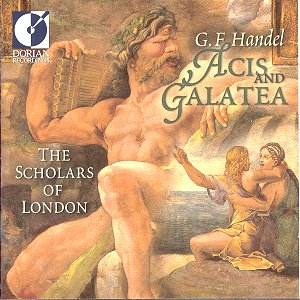 |
Georg Friedrich HAENDEL Acis and Galatea
Crotchet
AmazonUK AmazonUS |
Written in Naples just after 1708, Acis and Galatea is a dramatic cantata, designed to celebrate an aristocratic wedding. While smaller in scale than Haendel's operas, this work, one of the dozens of cantatas he wrote, nevertheless bears the mark of his dramatic works. The small number of musicians and singers certainly makes for a more limited work - there can be no large choral sections with only four singers - but the composition of this cantata is very similar to Haendel's operas, with its arias, choruses and duets.
This work had an interesting history. After Haendel went to London, he resurrected this work, in 1718, and it eventually became his most popular composition, being performed some 70 times during his lifetime. It was also one of Haendel's few works that were published during his lifetime. It was performed in different versions, both small in scale, and in a much grander edition. This recording features the smaller, original scoring, with the exception that the part of Damon is sung by a countertenor, as in the latter version.
This is a live recording, with all that live recordings entail. While it helps capture more feeling than studio recordings, it is not without imperfections. Yet, fortunately, these are few and far between. Singers and instrumentalists alike all perform admirably. The four singers fit perfectly together in the choral movements, such as the first chorus, O the pleasure of the plains, where their voices meld together beautifully in this fugal chorus, as they do in the chorus that opens part 2, Wretched love, a slow, moving piece. The small instrumental ensemble - only eight musicians - sounds fine in their accompaniment, maintaining a perfect balance.
One can understand why this work was so popular by listening to the arias. These are all beautiful songs, with memorable tunes, that make no great demands on the singers, but are highly melodic. Acis's aria, Love in her eyes sits playing, is a delightfully simple love song, well sung by tenor Robin Doveton, although his voice is a bit shaky at times. Together with soprano Kym Amps, his duet, Happy we!, that closes the first part of the work, is a moving and charming song.
David van Asch is a very articulate bass, and his voice is perfect for the role of Polyphemus. He shines in his arias, such as the fun O ruddier than a cherry, and the more emotional Cease to beauty to be suing.
All in all, this is a delightful recording that captures the energy of a live performance. One of Haendel's most popular works, this is much simpler than his operas, yet has a great deal of charm. A recommended recording.
Kirk McElhearn